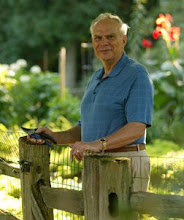For the purposes of this study our interests are twofold. First, What is Conrad saying about British imperialism? How is he evaluating it? Second, what are the implications for us as Americans, as America today seeks to impose her values on our world?
The Heart of Darkness begins with 5 seaman sitting on the deck of a yawl at evening in the London harbor. Behind them stretches the London metropolis, "the biggest and greatest town on earth," but we are repeatedly told that a "mournful gloom" rests upon it. The captain standing before them was the Director of Companies, "trustworthiness personified," but his work was "within the brooding gloom" (53).
The narrator's attention is focused upon Marlow who, sitting Buddha-like, begins to relate one of his "inconclusive experiences" (58). Note what type of man he is. Later in our reading we are told he greatly values work and hates lying above all things (85, 88). He muses that London itself was once "one of the dark places on the earth" (55) until the Romans and the Gauls brought civilization to it. "The conquest of the earth . . . is not a pretty thing when you look into it too much. What redeems it is the idea only (58). We are not told the precise nature of that idea. What does Marlow have in mind? Probably the ideal of humanistic attitudes.
As Christians we must conclude that the idea which best redeems an uncivilized society is derived from Judeo-Christian values. What are these? The importance of the individual, of freedom of choice, of the rule of law, are among them. It is only in the instilling of such values in a people that the "conquest of the earth" may be said to be redeemed. Whether or not Conrad understood this is unclear from the text; he focuses on the negative underside of things, and leaves the reader to conclude for himself the nature of the "redeeming idea."
Marlow begins by relating how as a child he gazed at maps (this is strongly autobiographical) and dreamed of sailing up rivers, especially the Congo, that resembled "an immense snake uncoiled" as it serpintined its way into the heart of Africa (60). To receive his assignment he visits the headquarters of the Continental Trading Company in Europe (probably Brussels) where, in the office he meets women that remind him of those mythical figures that guard the entrance to the underworld. In mythology there were three: Clotho, who spun the thread of life, Lachesis, who measured its length, and Atropos, who cut the thread.
After being examined by a doctor, who wants to measure his skull, he visits his aunt to bid her good-bye. She represents a blind idealism which Marlow quickly sees as being completely out of touch with reality. In an aside he remarks that women in general are out of touch with reality, a remark which not only tells the reader more about the character of Marlow, but also has thematic significance for the story. Since the reader disagrees with him on his assessment of the feminine nature, one is inclined to suspect other of his judgments, which is Conrad's intention, as he is writing in the impressionist literary genre.
After a slow and tedious trip by sea, Marlow arrives at the company station where he encounters blacks in the most abject and inhuman conditions, some in chains as criminals, herded by other blacks with guns, and many lying prone "in attitudes of pain, abandonment, and despair (71). In contrast to them is an immaculately dressed bookkeeper, whose appearance and bearing are completely incongruous with his surroundings. Marlow soon discovers that the prevailing motivation of all the whites he meets is simply to make money (76).
Soon Marlow begins to hear about Kurtz, a figure about whom everyone stands in awe. He is a "first class agent," who sends more ivory than all other agents put together (74), and who, at the same time has a reputation for being "an emissary of pity and science and progress." When Marlow is accused of being one of "the new gang--the gang of virtue" (83), he says he was suddenly enlightened, and almost laughs. What insight has he achieved? That Kurtz is using idealism as a cover-up for his own ambitions for wealth and personal advancement? Is it impossible to wed humanist idealism with ambitions for economic gain?

No comments:
Post a Comment